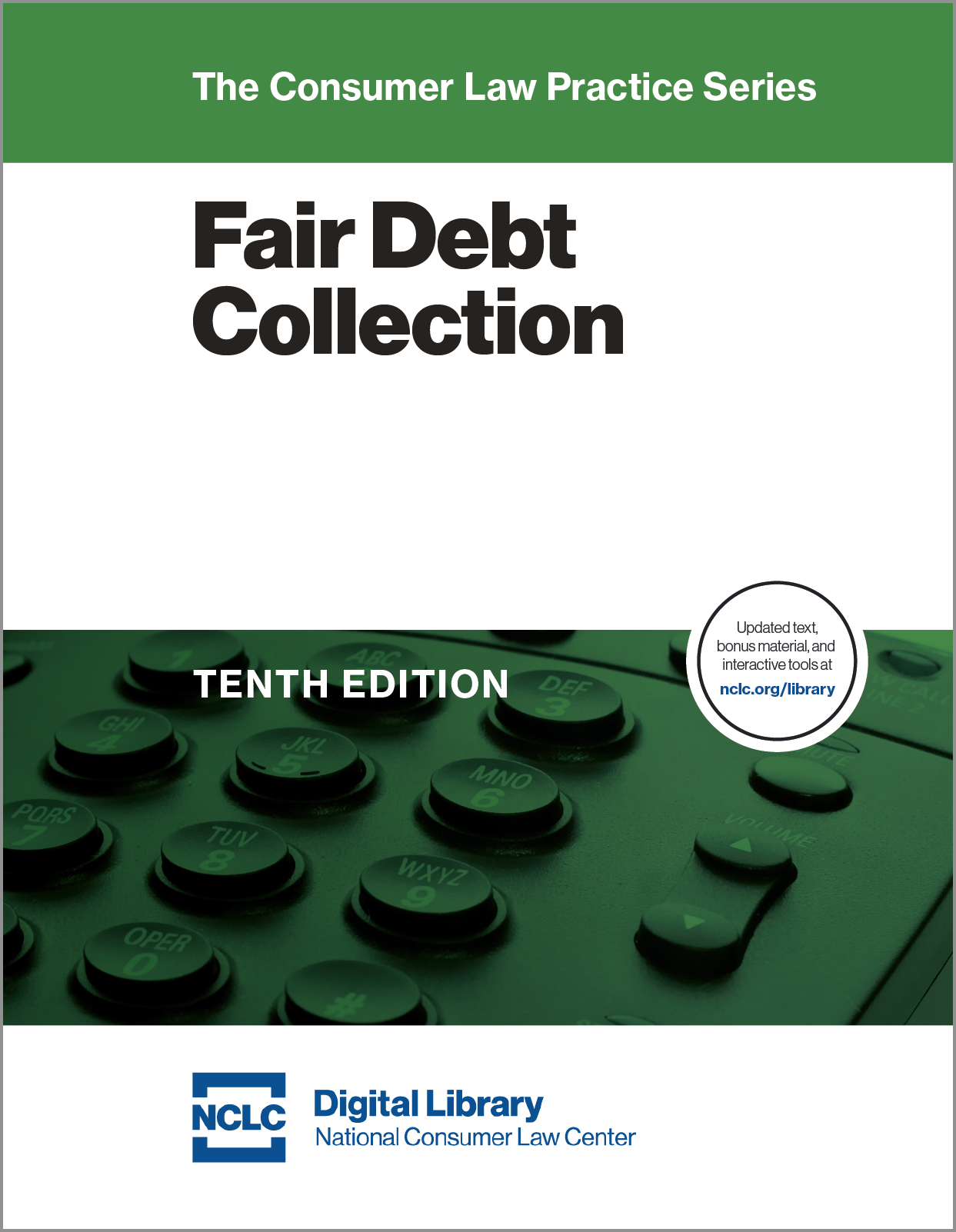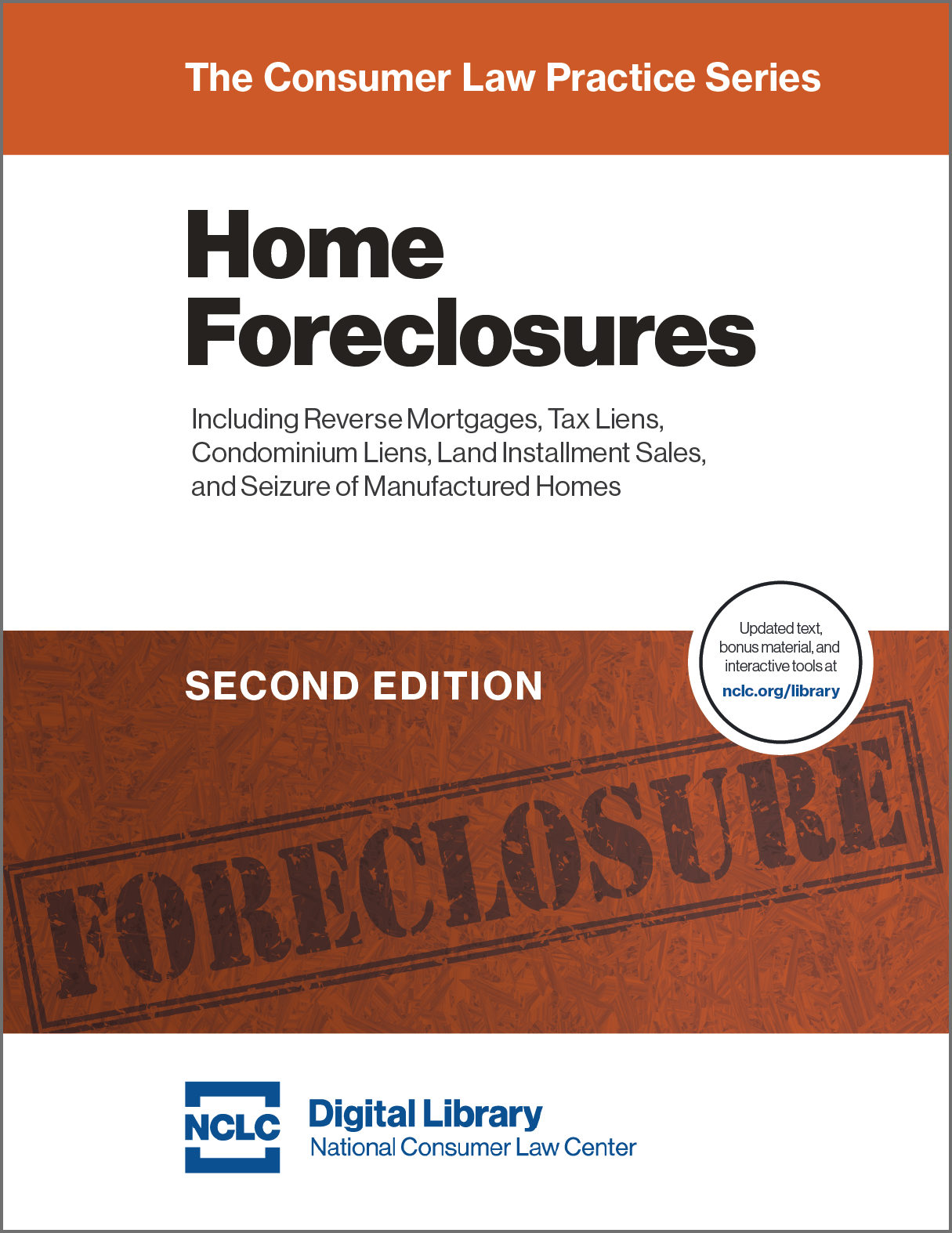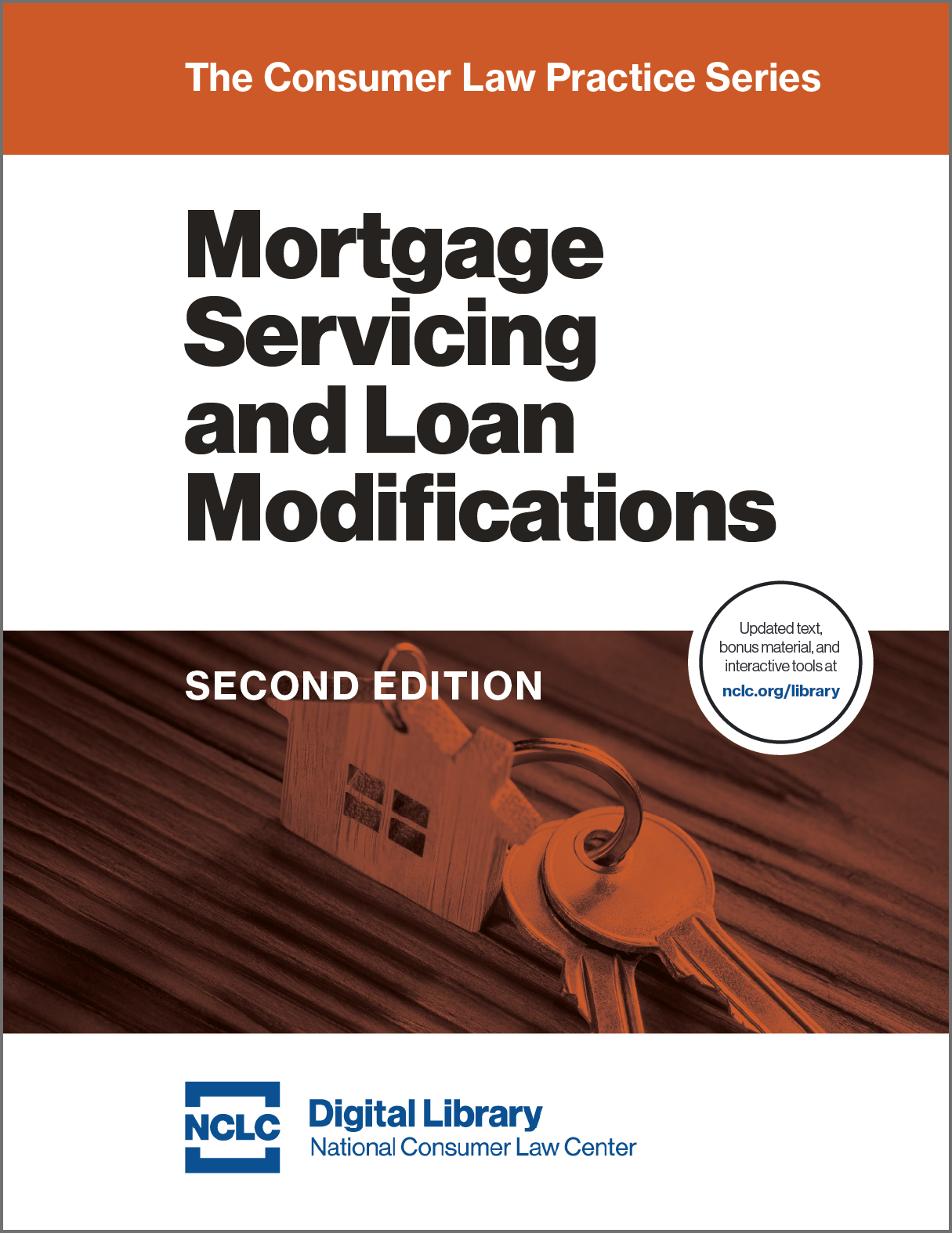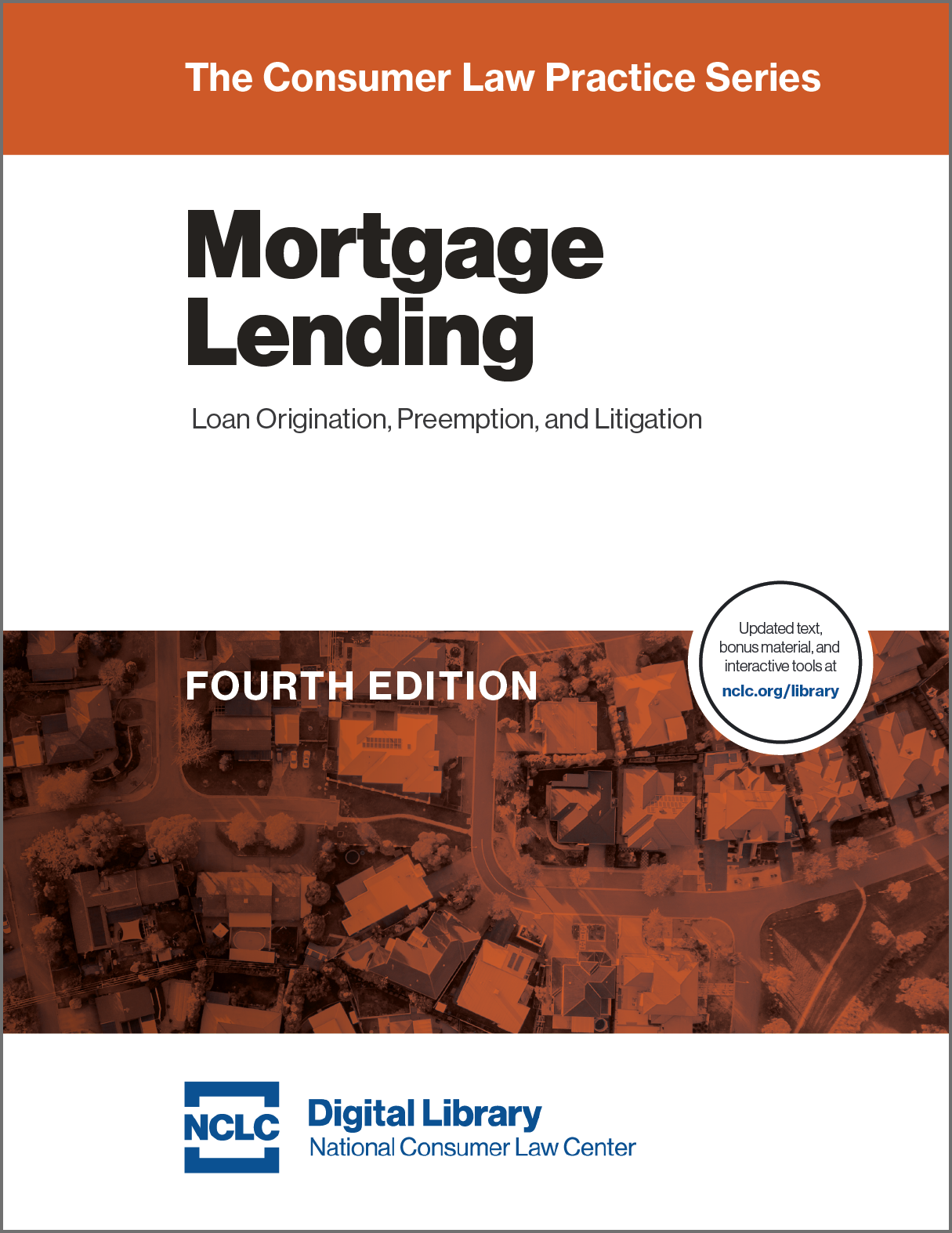Search
Birdseye View of All 2018 FDCPA Reported Appellate Decisions
This article summarizes all 34 FDCPA reported appellate decisions issued in 2018, reports on a pending Supreme Court FDCPA case, and describes NCLC’s digital tool to locate relevant FDCPA case summaries from summaries of over 14,000 FDCPA decisions.
Guide to Reducing Hospital Bills for Lower-Income Patients
FDCPA Coverage of Debt Buyers: Implications of Supreme Court’s June 12 Ruling in Henson
FDCPA Implications of May 15 Supreme Court Ruling on Abusive Bankruptcy Proof of Claims
Four Very Recent FDCPA Decisions from the Circuit Courts
The FDCPA Year in Review: 2020
This article reviews a very active 2020 concerning the Fair Debt Collection Practices Act (FDCPA). The article focuses on two sets of final Consumer Financial Protection Bureau rules on the FDCPA, one published in November and the other announced in December, and then summarizes all of the relevant 2020 circuit court of appeals FDCPA cases.
Viable FDCPA Claims Arising from Foreclosures After March 20 Supreme Court Decision
Overview
On March 20, 2019, the Supreme Court’s unanimous decision in Obduskey v. McCarthy & Holthus L.L.P. examined liability for violations of the Fair Debt Collection Practices Act (FDCPA) that are committed in non-judicial foreclosures. This article considers which FDCPA claims arising from foreclosures are viable post-Obduskey.
Supreme Court: Special Counsel’s Authorized Use of Attorney General Letterhead Not FDCPA Violation
In Sheriff v. Gillie, 578 U.S. __ (2016), a unanimous Supreme Court on May 16 held in a narrowly-crafted decision that attorneys hired as special counsel by the Ohio Attorney General’s Office for the collection of debts owed to state institutions do not violate the Fair Debt Collection Practices Act (FDCPA) when they use the Ohio Attorney General’s letterhead together with a disclosure that they are acting as special counsel.
Significant 2017 Fair Debt Collection Practices Act Developments
Stopping Debt Collection Harassment: Consumer Debt Advice from NCLC
Key Post-Henson Decision Holds Debt Buyer Is a "Principal Purpose" Debt Collector
Bankruptcy’s Role in Alleviating Criminal Justice Debt
Unpaid criminal justice debt can have draconian consequences, and this article explains how a bankruptcy filing can sometimes be effective in reducing that debt. Although criminal fines and restitution orders are not dischargeable in bankruptcy, other portions of a filer’s criminal justice debt may be dischargeable. The article also links to several resources covering this topic: a free May 13 webinar, a recent report, and NCLC treatises.
Effective May 3 New Federal Debt Collection Rule on Eviction Practices
This article explains a new CFPB Interim Final Rule, effective May 3, 2021, that increases information for tenants about COVID-related protection from eviction. The article also details tenants’ federal remedies against eviction attorneys and other debt collectors involved in the eviction that fail to provide or misrepresent that information.
Starting July 15: Protecting the Monthly Child Tax Credit Payments from Creditors
Starting July 15, families will receive each month an advance child tax credit up to $300 per child per month. This article examines existing consumer protections to safeguard payments from judgment creditors’ bank account garnishment and from the United States’ intercept to repay defaulted federal student loans. The article also considers tactics to protect paper check payments from garnishment.
Advising Clients When an Abusive Partner Coerces Debt
This article provides practical tips for advising clients with debt incurred by an abusive partner through coercion and fraud—developing a safety plan, documenting the coerced debt, protecting bank accounts, dealing with unauthorized credit card use, preventing an abuser from opening new accounts in the victimized partner’s name, addressing coerced debt on a credit report, and dealing with home mortgages.
Holding Off Foreclosures While Homeowners Await Billions in HAF Payments
Only about half the states are now accepting homeowner applications for payments from the Homeowner Assistance Fund (HAF), and few funds so far have been distributed. At the same time, because of the end of many COVID-19 related homeowner protections, large numbers of homeowners may soon face foreclosure.
This article explains which homeowners are eligible for HAF payments and explores solutions for the urgent problem that many eligible homeowners may lose their homes before they are able to receive the HAF payments which would have saved their homes.
Image

Widespread FDCPA Violations in Collection of Medical Debt
A new CFPB report highlights the astonishing amount of debt collection seeking medical debt not owed or owed in a lesser amount. This article describes reasons medical debt amounts are often inaccurate (including non-compliance with new federal and state legislation), details why such collection violates several FDCPA provisions, and explains how to overcome the medical debt collector’s legal defenses.
Roundup of 2023 FDCPA Appellate Court Reported Decisions
This article summarizes all 2023 Fair Debt Collection Practices Act (FDCPA) reported appellate court decisions, organized by topic. A highlight are eight appellate decisions examining standing in FDCPA cases. Some of the other topics include attorney fees, the bona fide error defense, the "debt collector" definition, and the FDCPA statute of limitations.
CFPB Clarifies Limits on Pay-to-Pay, Other Debt Collector Charges
A new CFPB advisory opinion not only clarifies when “pay-to-pay” fees are prohibited, but also whether a wide array of other debt collector charges violate the FDCPA. This article provides numerous examples of potentially illegal debt collector charges under the just-announced standards. A Truth in Lending Act provision provides even stronger remedies for fees added to automated payments for credit card debt.
Image
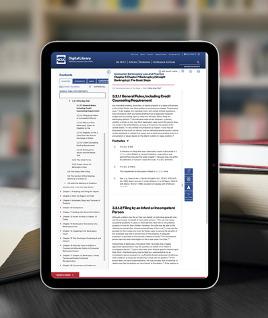
Our Five Favorite New Features on NCLC’s Revamped and Enhanced Digital Library
Here are our five favorite new features on the revamped NCLC Digital Library, giving you a faster, easier reading experience, letting you view extra content related to the page you are viewing, adding powerful new search options, offering at no charge over 1400 written submissions at NCLC conferences, and including free to the public 6000 chapter and appendix subsections.
